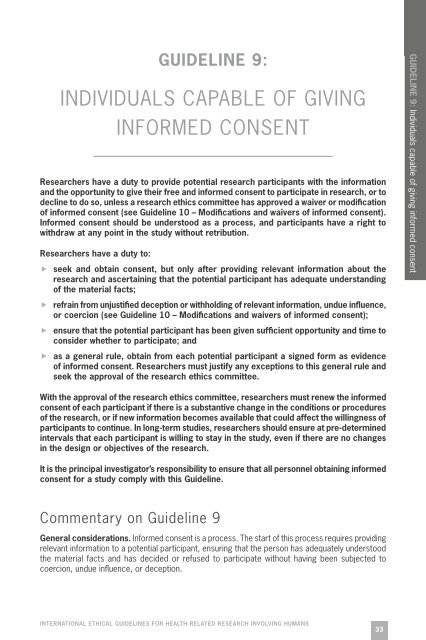International Ethical Guidelines for Health-related Research Involving Humans
WEB-CIOMS-EthicalGuidelines
WEB-CIOMS-EthicalGuidelines
Create successful ePaper yourself
Turn your PDF publications into a flip-book with our unique Google optimized e-Paper software.
GUIDELINE 9:<br />
INDIVIDUALS CAPABLE OF GIVING<br />
INFORMED CONSENT<br />
<strong>Research</strong>ers have a duty to provide potential research participants with the in<strong>for</strong>mation<br />
and the opportunity to give their free and in<strong>for</strong>med consent to participate in research, or to<br />
decline to do so, unless a research ethics committee has approved a waiver or modification<br />
of in<strong>for</strong>med consent (see Guideline 10 – Modifications and waivers of in<strong>for</strong>med consent).<br />
In<strong>for</strong>med consent should be understood as a process, and participants have a right to<br />
withdraw at any point in the study without retribution.<br />
<strong>Research</strong>ers have a duty to:<br />
ff<br />
seek and obtain consent, but only after providing relevant in<strong>for</strong>mation about the<br />
research and ascertaining that the potential participant has adequate understanding<br />
of the material facts;<br />
ff<br />
refrain from unjustified deception or withholding of relevant in<strong>for</strong>mation, undue influence,<br />
or coercion (see Guideline 10 – Modifications and waivers of in<strong>for</strong>med consent);<br />
ff<br />
ensure that the potential participant has been given sufficient opportunity and time to<br />
consider whether to participate; and<br />
ff<br />
as a general rule, obtain from each potential participant a signed <strong>for</strong>m as evidence<br />
of in<strong>for</strong>med consent. <strong>Research</strong>ers must justify any exceptions to this general rule and<br />
seek the approval of the research ethics committee.<br />
Guideline 9: Individuals capable of giving in<strong>for</strong>med consent<br />
With the approval of the research ethics committee, researchers must renew the in<strong>for</strong>med<br />
consent of each participant if there is a substantive change in the conditions or procedures<br />
of the research, or if new in<strong>for</strong>mation becomes available that could affect the willingness of<br />
participants to continue. In long-term studies, researchers should ensure at pre-determined<br />
intervals that each participant is willing to stay in the study, even if there are no changes<br />
in the design or objectives of the research.<br />
It is the principal investigator’s responsibility to ensure that all personnel obtaining in<strong>for</strong>med<br />
consent <strong>for</strong> a study comply with this Guideline.<br />
Commentary on Guideline 9<br />
General considerations. In<strong>for</strong>med consent is a process. The start of this process requires providing<br />
relevant in<strong>for</strong>mation to a potential participant, ensuring that the person has adequately understood<br />
the material facts and has decided or refused to participate without having been subjected to<br />
coercion, undue influence, or deception.<br />
INTERNATIONAL ETHICAL GUIDELINES FOR HEALTH-RELATED RESEARCH INVOLVING HUMANS<br />
33


